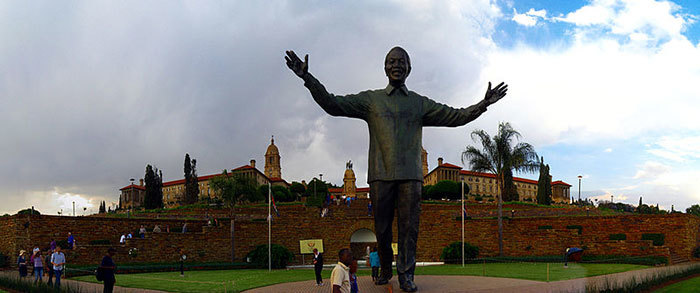South Africa needs a professional civil service
01 June 2015 | Story by Newsroom
Endless factional battles, suspensions, resignations, golden handshakes, graft, cronyism. These are symptoms not only of institutional dysfunction but also of a failing public service in South Africa today.
This state of affairs is a far cry from the post-1994 democratic transition which brought with it expectations of significant improvements in services and access to basic services. These expectations were best summed up in the ruling African National Congress's promise of "a better life for all" promise .
Pervasive failure to deliver basic services
The reality has been very different. There have been improvements in access to basic services along a number of indicators – from electricity to water and sanitation. But failure to deliver basic services across the country is unacceptably pervasive.
Confidence in the public service has been further eroded by skills deficiencies in the bureaucracy. This has led to excessive reliance on costly consultants, as well as widespread reports of corruption.
Cooperative governance and traditional affairs minister Pravin Gordhan says one in three municipalities is dysfunctional. He has an unenviable task of administering his bitter, yet necessary back-to-basics remedy to cure the ills afflicting municipal governments.
The failure of local authorities to meet basic delivery standards has prompted a wave of angry protests.
Communities have also resorted to taking local municipalities to court over service delivery failures. In many cases the courts have ruled in favour of the disgruntled communities. Alarmingly some municipalities have failed to comply with court orders to improve public services.
Across all spheres of government there have been numerous cases of poor governance and corruption. Successive reports by the Auditor-General have highlighted billions of taxpayers' money misspent through unauthorised, irregular, fruitless and wasteful expenditure.
There have also been numerous reports of conflicts of interest involving public officials. And performance management systems implemented by the ANC government have generally not led to significant improvements in accountability.
Public servants or politicians?
Political factors have played a disproportionate role in decisions on the promotion, transfer and performance assessments of government officials. The excessive politicisation of the public service has been driven by the ANC government's strategy to install party members in administrative offices and to control top government appointments.
A worrying trend has been the high turnover of department heads in government. About R44-million a year has been spent on director-generals who have not been doing the jobs they were employed to do.
Between 2009-2014 a total of 177 permanent and acting directors general ran government departments. Of this, 28 directors-general did not complete their full terms.
The Public Service Commission, which monitors the public service, points out that leadership stability is indispensable to optimal performance. And that staff morale is negatively affected by a constant change of leadership.
There has been evidence of excessive mobility within the public service. Officials are moved from junior to senior positions without adequate assessments. This suggests that skills are under-emphasised in the appointments and promotions.
Not only has extreme politicisation of the public service fuelled clientelism, cronyism and corruption, it has also eroded technical knowledge, skills and accountability among public servants.
Nowhere has this been clearer than in the state-owned enterprises (SOEs) such as the power utility Eskom, South African Airways, South African Broadcasting Corporation and the SA Post Office.
State-owned enterprises play a significant role in the South African economy. They have been identified by the ANC government as pivotal to the pursuit of growing the economy and fostering development.
Yet they continue to be plagued by numerous problems that have undermined their ability to respond to the government's agenda.
There is a game plan, but no action
South Africa is a long way from realising the vision of building a truly capable state. What this should look like is set out clearly in the National Development Plan, which has been adopted by the government.
The NDP argues that to address poverty and inequality, South Africa needs a state that is capable of playing a developmental role. This requires well-run state institutions staffed by skilled public servants committed to the public good.
This vision is achievable if key problems are addressed. These include making a clearer separation between the roles of political principals and administrative heads and creating a public service that is shielded from political patronage. This would mean doing away with political deployments.
Public servants also need to be shielded from political interference and job security should be decoupled from political patronage and whims. Recruitment policies should emphasise experience, skill and expertise. Clear career paths should also be developed for technical specialists.
Finally, state-owned enterprises must be reformed and their governance structures improved.
South Africa has clearly identified what an efficient public service looks like. In addition, there are exemplary models, such as Singapore's that it could emulate to create a meritocratic, professional, highly capable and corruption-free public service.
Written by Mills Soko, Associate professor, Graduate School of Business at University of Cape Town
|
This article first appeared in The Conversation, a collaboration between editors and academics to provide informed news analysis and commentary. Its content is free to read and republish under Creative Commons; media who would like to republish this article should do so directly from its appearance on The Conversation, using the button in the right-hand column of the webpage. UCT academics who would like to write for The Conversation should register with them; you are also welcome to find out more from carolyn.newton@uct.ac.za. |
 This work is licensed under a Creative Commons Attribution-NoDerivatives 4.0 International License.
This work is licensed under a Creative Commons Attribution-NoDerivatives 4.0 International License.
Please view the republishing articles page for more information.










